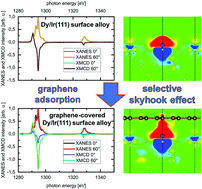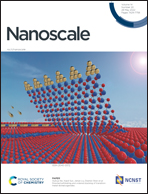Tailoring magnetic anisotropy by graphene-induced selective skyhook effect on 4f-metals†
Abstract
From macroscopic heavy-duty permanent magnets to nanodevices, the precise control of the magnetic properties in rare-earth metals is crucial for many applications used in our daily life. Therefore, a detailed understanding and manipulation of the 4f-metals’ magnetic properties are key to further boosting the functionalization and efficiency of future applications. We present a proof-of-concept approach consisting of a dysprosium-iridium surface alloy in which graphene adsorption allows us to tailor its magnetic properties. By adsorbing graphene onto a long-range ordered two-dimensional dysprosium-iridium surface alloy, the magnetic 4f-metal atoms are selectively lifted from the surface alloy. This selective skyhook effect introduces a giant magnetic anisotropy in dysprosium atoms as a result of manipulating its geometrical structure within the surface alloy. Introducing and proving this concept by our combined theoretical and experimental approach provides an easy and unambiguous understanding of its underlying mechanism. Our study sets the ground for an alternative path on how to modify the crystal field around 4f-atoms and therefore their magnetic anisotropies.



 Please wait while we load your content...
Please wait while we load your content...